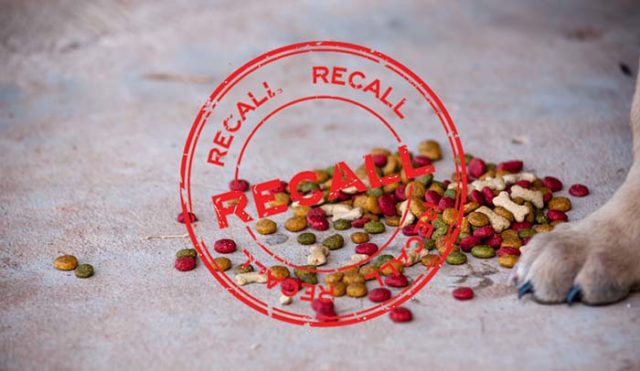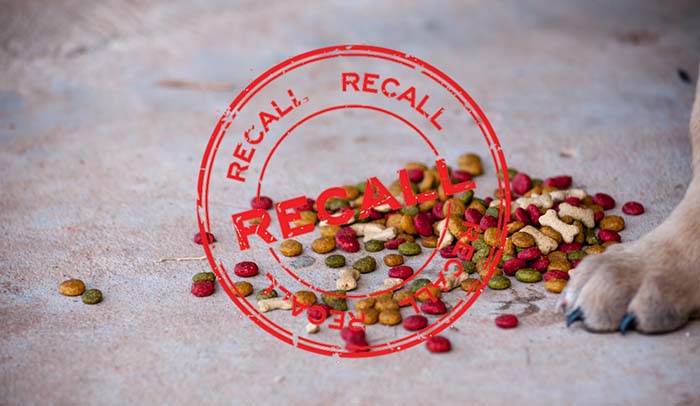
Table of Contents
You pay good money for dog food to keep your pets healthy.
But what do you do if the high-quality pet food you've been feeding your dog gets recalled?
Dog food recall alert is not something any of us want to see or hear about, but it's important to pay attention.
It's a harrowing thought, realizing that you never know when manufacturing mistakes might happen that can harm or even kill your dog.
For all the controversy and anger directed at dog food companies, most pet food manufacturers follow very strict standards for safety and security, yet mistakes happen, and dog food recalls cannot be avoided.
ALSO READ: 10 Brands With Most Dog Food Recalls
What is a dog food recall alert?
The Food and Drug Administration (FDA) describes a recall as “when a product is removed from the market, or a correction is made to the product because it is either defective or potentially harmful”.
Pet food recalls can be divided into two categories:
- An involuntary FDA-issued recall
- A voluntary recall (decision by the manufacturer to recall the food of their own volition)
When the FDA issues a recall before the company does so, it means they were alerted to a possible problem through consumer complaints, or they, themselves, discovered a problem when testing a pet food product.
Problems might include contamination with a pathogen like E. coli or salmonella (the most common) or the insufficient use of certain nutrients.
You probably remember the massive recall in 2007 after melamine contamination led to pets getting sick or dying.
It was a scary time for all pet owners.
It wasn’t until pets and, at a later stage, babies fell ill that melamine was known to be a problem in pet foods and even human food.
No one suspected that this substance would be added to food and for that reason, there was a delay between when the first cases were reported and when the food was finally recalled; we simply didn't think about testing for melamine.
In another dog food recall, one of the more recent ones in February 2017, horse meat and a drug known as pentobarbital, commonly used for the euthanasia of pets and horses, was found in two different brands of canned dog food.
Once again, this caused a scandal, with pet owners being endangered by improper manufacturing practices of dog food companies.
The meaning of dog food recalls
Before you frantically start making your dog’s food at home, keep in mind that human foods and meat are more likely to be recalled than pet food.
You can see a partial list of human foods being recalled on the USDA site here (two foods have already been recalled just yesterday alone).
A dog food recall does not mean that your dog’s favorite food is consistently made of bad-quality ingredients.
Unlike making plastic bottles or metal cans, food manufacturing is a tricky process, and mistakes do happen; similarly, if a specific brand has not been recalled in the past, it does not mean the food will always be good quality and ‘mistake-free’.
For example, the manufacturer of one of the phenobarbital-contaminated foods had not previously had a recall.
The company did, however, have some FDA quality control issues, which might be something you can look out for when choosing your pet’s food.
We've had our pet food expert consider the company's reputation and chances of their foods being recalled when compiling a list of this year's best puppy food brands here.
The bottom line is if your dog's food gets recalled, investigate the situation.
Look at the reason for the recall and how it was handled by the company.
This will help guide you in making a decision on whether you should continue buying your pet's food from that specific manufacturer or switch over to another one.
How to know about a dog food recall
It is an undeniable fact that not all dog owners know when their pet's food gets recalled.
Not every pet owner spends a lot of time on social media, where it's common to share dog food recall alerts.
Not all cases of pet food recalls are reported on the news, so it's up to you to keep up to date with the pet food industry.
To help you effectively track these things, here are a few links you can check regularly to make sure your dog's food doesn't happen to be part of a recalled batch:
On some of these websites, you can sign up for email notifications as a fast way to get informed of any dog food recall alerts.
You can also get all FDA CVM recall updates by following @FDAanimalhealth on Twitter. You'll see messages like these:
FDA Alerts Pet Owners About Potential Pentobarbital in Certain Gravy Train, Kibbles ‘N Bits, Ol’ Roy, & Skippy Canned Dog Food Made by JM Smucker https://t.co/iNF7yQx5uw #petfood
— FDA CVM (Center for Veterinary Medicine) (@FDAanimalhealth) February 16, 2018
But be sure to turn on notifications to make sure you know as soon as a recall happens.
What to do after a dog food recall
Stop feeding it. If you find out your dog's food has been recalled, stop feeding the product to your dog immediately.
Changing your dog's diet suddenly will have negative effects on his digestion, so it is advisable to find a product similar to the one that was recalled.
Pick a different batch. Usually, only certain batches of the product will be cleared off the shelves, making it possible for you to buy a new bag of the same food.
Of course, confirm by reading the dog food recall information thoroughly to determine which batches are contaminated and whether you should continue buying from this dog food company.
Contact; get a refund. If you are still unsure or have questions, contact the manufacturer of the product.
Companies are required to provide you with all the necessary information about their products, ingredients, and manufacturing practices, so ask away.
You will also be able to return the product to the place where you bought it for a full refund.
(Don't) Throw it away. Safe disposal of contaminated pet food should be next on your list, as you don't want your dog or any other animal to come into contact with it by mistake.
In some cases, manufacturers will dispose of the food for you to avoid any further risks.
Some dog owners do, however, recommend that you keep some of the food in an airtight bag or container in the freezer until your dog has been deemed healthy by either you or your veterinarian.
The reason is that if your pet becomes ill, a sample of the food is needed for testing, so you will have it readily available, preventing any delay in diagnosis and the start of treatment.
Check-in with a vet. Manufacturers will, most of the time, distribute a list of possible symptoms to look out for, but with dog food recalls, it is better to be safe than sorry.
Take your dog to a veterinarian for a check-up, even if he is not showing any signs of illness.
To avoid similar problems in the future, choose top dog food brands with a good track record, FDA-approved facilities, and those least likely to be recalled.
Write it down. In the unfortunate event that your dog takes ill after eating recalled food, keep all records.
Write it all down and note dates, amounts, symptoms – everything.
The manufacturing company has a legal obligation to account for any negative effects caused by their product.
Keep in contact with them until they reimburse you for the food as well as the vet bills.
You can also file a report with the FDA. Your action will be helpful in protecting other dogs from facing the same illness.
READ NEXT: 9 Rational Ways to Assess Healthy Dog Food














